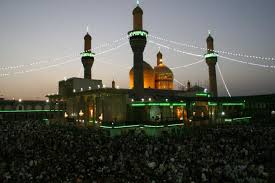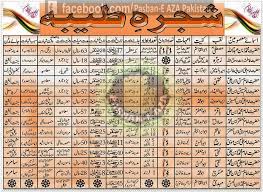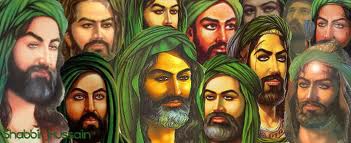Ambassadors of Islam 
And those who strive hard for Us, We will most certainly guide them in Our ways; and Allah is most surely with the doers of good. 29:69 The Quran
Imam Musa Kazim:
Miracle of Human Perseverance
Dr. Javed Kazmi
The world has not seen such spectacle of perseverance, fortitude, courage and devotion as was put up by Imam Moosa-e-Kazim, the 7th of the twelve Holy Imams about whom Holy Prophet Muhammad (PBUH) said "I shall be succeeded by twelve religions leaders, all of whom will be of Quraish origin". (Sahih Bokhari).
Imam Moosa-e-Kazim was the son of Imam Jafar-as-Sadiq and passed 20 years of his life under the gracious patronage of his Holy Father. He was gifted with a genius par excellence and received enlightened guidance from the Holy Imam Jafar-as-Sadiq. Even in his childhood he was fully versed with Divine knowledge.

Holy Mausoleum of Imam Musa Kazim (AS)
Allama Mjlese in "Biharul Anwar" relates that once Abu Hanifa, a student of Imam Jafar-as-Sadiq and now the Imam of Ahle Sunnah, called at Imam Jafar-as-Sadiq to ask some questions relating to religious matters. The Imam was asleep therefore he had to wait for him outside the house. Meanwhile Imam Moosa-e-Kazim, then a five year old child, came out Abu Hanifa after offering him his best compliments enquired: "O! the son of the Holy Prophet (PBUH)! what is your opinion about the deeds of a man? Does he do them by himself as does God make him do them?
The five year old Imam in the typical tone of his ancestors at once replied " Abu Hanifa, the doings of a man are confined to three possibilities. First, that God alone does them while the man is quite helpless. Second, that both God and the man do equally share the commitment. Third, that the man does them alone. Now if the first assumption is true, it obviously proves the unjustness of God who punishes his creatures for sins which they have not committed. And if the second condition be acceptable even then God becomes unjust if He punishes the man for the crimes in which he is equally a partner. But obviously both these conditions are undesirable in the case of God. Thus naturally we are left with the third alternative to the problem that men are absolutely responsible for their own doings".
Imam Jafar-as-Sadiq breathed his last on 15th Rajab 148 AH and the same day Imam Moosa-e-Kazim succeeded the Holy office of Imamat as the seventh Imam. The period of his Imamat continued for the next 35 years. In the first decade he imparted with his responsibilities and propagated the teachings of the Holy Prophet (PBUH) in somewhat peaceful atmosphere. But soon after he fell victim to the wrath of unscrupulous Abbaside kings and a greater part of his life he had to spend in prison.
Imam Moosa-e-Kazim lived in the most critical times. The Abbaside kings were marked for their tyranny, despotism and unscrupulous oppression. The Imam witnessed the excesses of three kings namely Mansur-e-Dawaniqi, Mehdi and Haroon-al-Rashid. Mansur and Haroon were inconsiderate, thoughtless, impertinent, audacious and presumptuous despotic kings. They were staunch enemies of the innocent descendants of the Holy Prophet (PBUH) and put countless of them to sword. Thousands of them were buried alive inside walls or thrown in horrible dark prisons for the whole life. These unscrupulous and crooked "caliphs" knew no pity, compassion, clemency, mercy or justice for the descendants of the Holy Prophet (PBUH).
The Imam was saved from the tyranny of Mansur because he was over-occupied with the construction of Baghdad, the new capital. He could not get time to turn to the Imam and victimized him. On his death his son Mehdi ascended the throne. With him a period of trials and tribulations for the Imam started. When Mehdi visited Medina in 164 A.H. he could not bear with the tremendous popularity of the Imam. He could not resist his jealously and the spark of his ancestral malice against the Ahl-ul-Bait was kindled.
He managed to take the Imam along with him to Baghdad and imprisoned him there. After a year he realized his mistake and released the Imam. Hadi succeeded Mehdi but he lived only for a year. In 170 A.H. the most cruel, heartless and vicious king succeeded the Abbaside Empire. It was during his regime that the Holy Imam passed the greater part of his life in a prison till he died.
After assuming the mantle of Imamat, Imam Kazim had to spend most part of his life in prison. Even then he presented a magnificent example of composure, restraint, temperance and prudence to his followers. Ibne-Hajar taking note of Imam's morality and ethical excellence remarks, "the patience and forbearance of Imam Moosa-e-Kazim was such that he was given the title of Al-Kazim (one who swallows down his anger). He was the embodiment of virtue and generosity. He devoted his nights to prayers and his days to fasting. He always forgave those who wronged him.
Time and circumstances did not allow the Imam to carry out his work peacefully. The cruel rulers never gave any chance to the Imam to establish religious institutions on the lines of his father Imam Jafar-as-Sadiq and his grandfather, Imam Muhammed-ul Baqir. They were able to do that because the Umayyed were being uprooted and Abbasides were busy in establishing themselves in the seat of power.
The reign of Haroon-al-Rashid was ruthless, vicious, inhuman and merciless of all the Abbaside kings and it never allowed Imam Moosa to address a congregation. He, however, carried out his mission of preaching and guiding the people quietly. He also authored a few books and the most famous of them is "Musnand of Imam Moosa-e-Kazim.
The death circumstances of the great preacher of human dignity and tolerance are a stigma on the conscience of Muslim History. In 179 A.H. king Haroon-al-Rashid visited Medina.
The great influence and popularity which the Holy Imam wielded among his followers kindled a fire of malice and jealousy in him. He arrested the Imam while he was offering prayer at the tomb of the Holy Prophet (PBUH) and imprisoned him in Baghdad for about four years. He poisoned the Imam in prison on 25th Rajab 183 AH. Even his corpse was not spared humiliation and was taken out of the prison and was left on the Bridge of Baghdad. His devotees, however, managed to get hold of his Holy body and laid it to rest in Kazmain (Iraq).
His shrine to date is a source of inspiration and enlightenment to millions of people who visit it each year. It will remain a living miracle on earth to serve the suffering humanity till the day of judgment.
Information
Imam Moosa-e-Kazim was the son of Imam Jafar-as-Sadiq and passed 20 years of his life under the gracious patronage of his Holy Father. He was gifted with a genius par excellence and received enlightened guidance from the Holy Imam Jafar-as-Sadiq . Even in his childhood he was fully versed with Divine knowledge.
Reprinted on May 25, 2014


